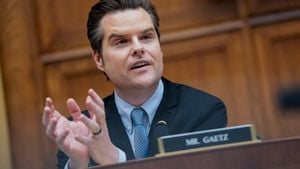With COP29 currently taking center stage in Baku, Azerbaijan, the stakes for climate action and financial commitments between global players are at an all-time high. The conference kicked off on November 11, 2024, and runs for two weeks, drawing thousands—including government officials, celebrities, and activists—who aim for substantial financial solutions to combat climate change, particularly for poorer nations.
This year, the conference is pushing for $1 trillion, asserting this figure is fundamental to reach the goals outlined by the UN and the International Monetary Fund. This is part of the effort to renew financial commitments as the existing target of $100 billion annually for climate financing to developing countries is set to expire by 2025, with indications from multiple organizations highlighting the urgent need for funds.
Yet, all this money being discussed couldn’t fully mask the stark reality: carbon dioxide emissions are still rising sharply. The search for improved living standards through energy consumption is being prioritized over climate commitments, and carbon emissions reached record levels, surpassing previous highs.
Specifically, the United States and the EU are eagerly pushing for China's involvement as both parties scramble to secure funding commitments. Interestingly, China continues to be labeled as a “developing nation” under the provisions of the 1992 UN treaty, which raises eyebrows, especially when considering its status as the leading global emitter of carbon dioxide.
China, on the other hand, is maneuvering COP29 discussions to focus on global trade. It’s drawing support from countries like India, Brazil, and South Africa, especially amid concerns over tariffs and taxes being strategically employed by the U.S. and EU to safeguard their industries against China's dominance of green technologies such as solar panels and wind turbines.
Adding to the intricacies of these negotiations is the backdrop of the U.S. political situation. Former President Trump is poised to make another withdrawal announcement from the Paris Agreement, which could throw the talks’ dynamics off-balance. If he forms the government again, he may also target the UN Framework Convention on Climate Change, complicatng the international dialogue on climate efforts.
Despite these lofty financial discussions, there's skepticism surrounding the actual impact of the climate funding disbursed so far. Data indicates carbon dioxide emissions increased by 1.3% last year, with predictions of another 0.6% hike this year. The bare minimum goal of achieving over 5% reductions annually, as stipulated by the Paris Agreement, now seems like quite the challenge.
The $100 billion benchmark, initially set back in 2009 to assist low- to middle-income nations, is facing mounting repercussions for not keeping pace with the actual costs of climate strategy implementations, projected to soar to $2.4 trillion annually, excluding China. Analysts estimate most of this need—around $1.4 trillion—has to come from internal initiatives, with at least $1 trillion requiring international support.
One significant concern among developing nations is the nature of assistance they’ve previously received; much of it came attached to loans rather than grants, leading to substantial debt burdens. For example, low-income countries coughed up over $59 billion last year to repay debts, which is significantly more than the $28 billion they received as climate aid. Consequently, there’s been growing sentiment favoring grants over loans to ease the financial strain on these countries.
To make matters worse, the operational framework of institutions like the World Bank, along with development banks, is under scrutiny as organizations call for reforms to increase resource allocation for climate mitigation. Many are also advocating for the establishment of effective monitoring systems to assure developed nations fulfill their financial promises and assist developing regions effectively.
Interestingly, current talks at COP29 also introduced the concept of “solidarity levies.” These new funding proposals could capture billions from sources like cryptocurrency, the ultra-wealthy, and travelers who frequently fly, presenting fresh avenues to support climate action. The goal is to generate financial streams to help those who need it the most without unilateral reliance on government allocations.
From the perspective of environmentalists and activists, the urgency for addressing climate concerns was evident outside the conference halls, where protests erupted tying the raging war in Gaza to neglect for climate action. Mottos such as “Make polluters pay” reverberated through the air, showcasing the increasing frustration of activists directly linking governmental failures to broader environmental crises.
Underlining the present urgency, reports from activist groups warn alarming trajectories show the planet is on course for 2.7 degrees Celsius rise by the end of the century if current policies go unaltered. This grim prediction starkly warns of the dire consequences humanity may face if decisive action is not taken now.
With all these developments brewing, COP29 marks itself as another pivotal moment for global climate action. The next couple of weeks will determine whether financial pledges can be made and if genuine collaboration can steer the planet toward sustainable change. The pressure is palpable—leaders must decide whether to rally for collective responsibility or let old patterns dictate the future.



